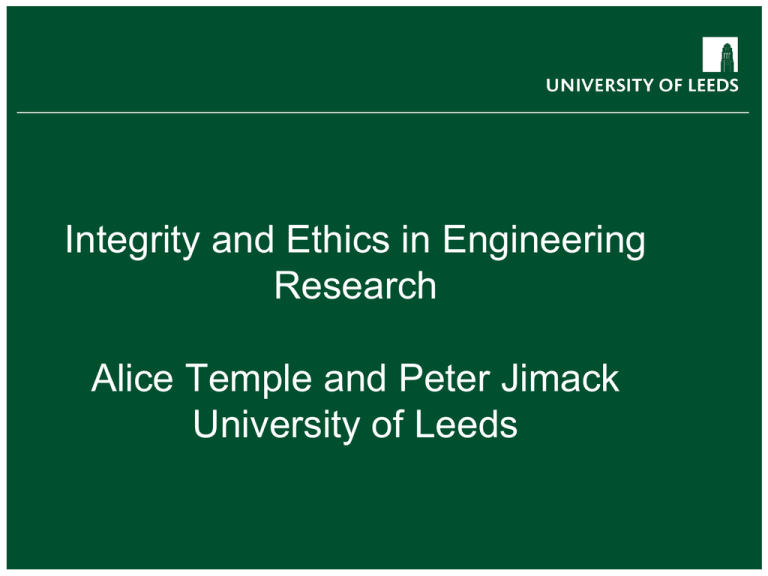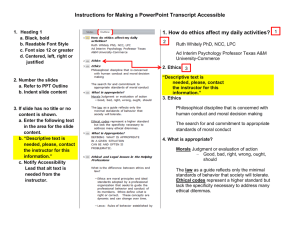Integrity and Ethics in Engineering Research Alice Temple and Peter Jimack
advertisement

School of something FACULTY OF OTHER Integrity and Ethics in Engineering Research Alice Temple and Peter Jimack University of Leeds Overview Trust Meanings of Integrity and Ethics Themes in Ethics in Engineering Research Balancing Risks and Benefits Moral Values Embedded in Engineering Integrity in Engineering Research Environmental Impact of Research Social Consequences Ethics and Engineering According to a recent survey which is the most trusted profession in the UK? Answer 1) Doctors 2) Academics Why is this relevant? Membership of a trusted profession and position of trust generates special responsibilities. Medical professionals are in an analogous position. Engineering researchers are experts on risk and potential harms and benefits of e.g. technological developments (Incidentally Estate Agents and Lawyers came last) What do we mean by integrity and ethics? Integrity: Coherence of word and deed and a collection of qualities clustered around truth and fair dealing. Integrating one’s professional life and personal convictions Engineering Research Ethics: Concerning obligations, rights, ideals of character and minimising harm to humans, animals and the environment. The responsibilities and rights that ought to be endorsed in engineering research Desirable ideals in engineering research The Big Picture “Virtue leads to happiness” (Aristotle) Ethical research the most fulfilling “Moral excellence comes about as a result of habit.” (Aristotle) Internal self-management the paradigm “The world is a dangerous place, not because of those who do evil, but because of those who look on and do nothing” (Albert Einstein) Integrity by association, “a duty to whistle-blow”? Competing pressures challenging “doing the right thing” Themes in Ethics of Research in Engineering There are many “obvious” types of activity for which ethical consideration is required by engineering researchers… Use of human subjects (especially “vulnerable” groups); Use of human tissue; Use of human data (including images); Presentation of research results in full and balanced manner; Etc, etc. These are not the main focus of this discussion however… Themes in Ethics of Research in Engineering: Our Focus 1) Moral values pervade all aspects of technological development: ethics and excellence in engineering cannot be separated. 2) Engineering projects generate new possibilities and risks, engineers share responsibility for creating benefits, preventing harm and advising on dangers 3) Personal integrity/commitments matter in engineering, in addition to principles of responsibility 4) Engineering ethics concerns both decisions made by individuals and general directions of technological development, collective responsibilities of engineers, and engineering professional societies 5) Ethical dilemmas and potential conflicts of interest arise in engineering, as elsewhere, due to myriad and potentially conflicting moral values Moral Values are Embedded in Engineering Research Moral values and judgements are embedded throughout engineering research: Basic standards of safety and efficiency; Structure of research groups as communities of people engaged in shared activities and goals: with shared credit and rewards; The idea that engineering research seeks to combine advanced skills with a commitment to the public good! Balancing Risks and Benefits Technological development is central to human progress. However, many developments carry with them potential risks, side-effects or consequences. If new technologies are to be accepted by society to what extent must they be attuned to the needs, aspirations and views of society? To what extent are engineering researchers responsible for providing this information on both risks and benefits? Who else is equipped to do this? Balancing Risks and Benefits Optimists will point to benefits of engineering achievements but to what extent should these be tempered by highlighting the potential risks? Ubiquitous computing and remote sensing; Energy supply: nuclear, tidal, bio-mass, etc.; Bio-medical engineering; Etc. Personal Integrity in Engineering Research What does personal integrity in engineering research amount to? The classical concept of “integrity in research” is a given! Accepting and sharing responsibility for the work; Imaginatively foreseeing risks and possible harms; Conscientiously monitoring projects; Alerting others of potential harms to enable them to give informed consent to risks; Combining economic growth, social justice and environmental care…… Economic growth, social justice and environmental care. Sustainable development needs to combine economic growth, social justice and environmental care, balancing the needs of the present against those of future generations. To what extent is this something that we should be considering as engineering researchers? Social Justice / Environmnetal Impact Ethical ramifications of research – e.g. bio-fuels raise ethical considerations as can impact on food prices & therefore the poor. Significant unrest in Mexico due to a 400% increase in price of tortilla flour resulting from demand on corn for bio-fuels. Engineers well placed to make environmental contributions. Should we seek to encourage corporations to adopt greater environmental concern, finding ways to embed that concern in economically viable technology? Conflicts of Interest Higher education institutions are under increasing economic pressures. Increasingly researchers are encouraged to seek financial ties, and businesses are keen to utilise the expertise that HEIs can bring to benefit society and economy. This “commercialisation of research” can lead to creative partnerships. But it also brings the risk of the distortion of objective judgement in terms of secrecy, conflicts of interests and manipulation of research results. A Relevant Statistic To demonstrate how this can affect research results look at this statistic: 94% of researchers with ties to the tobacco industry found no harmful effects when they studied second-hand smoke, 13% with no such ties reported such results (Bok, 2003) Those with sponsorship are 7 times less likely to report harmful effects of second-hand smoke. Remember: it is not just what is reported; it is also what is not reported! When should conflicts of interest be constrained? If it leads to the researcher not being able to speak freely If it tempts them to use fraudulent means If it damages relations with colleagues If it conceals discoveries or information needed by society (e.g. had the discovery of insulin been kept secret) If it covers up illegal acts or the dangers of a product or process e.g. concealment of side-effects of drug If it hampers free communication about large areas of potential development Are there other examples too? Summary and Possible Points for Discussion Fundamental moral values and responsibilities. Benefits versus potential risks – the engineer’s roles? Personal integrity Combining economic growth, social justice and environmental care – responsibilities to all sections of society? Awareness of conflicts of interest – and behaving appropriately?




